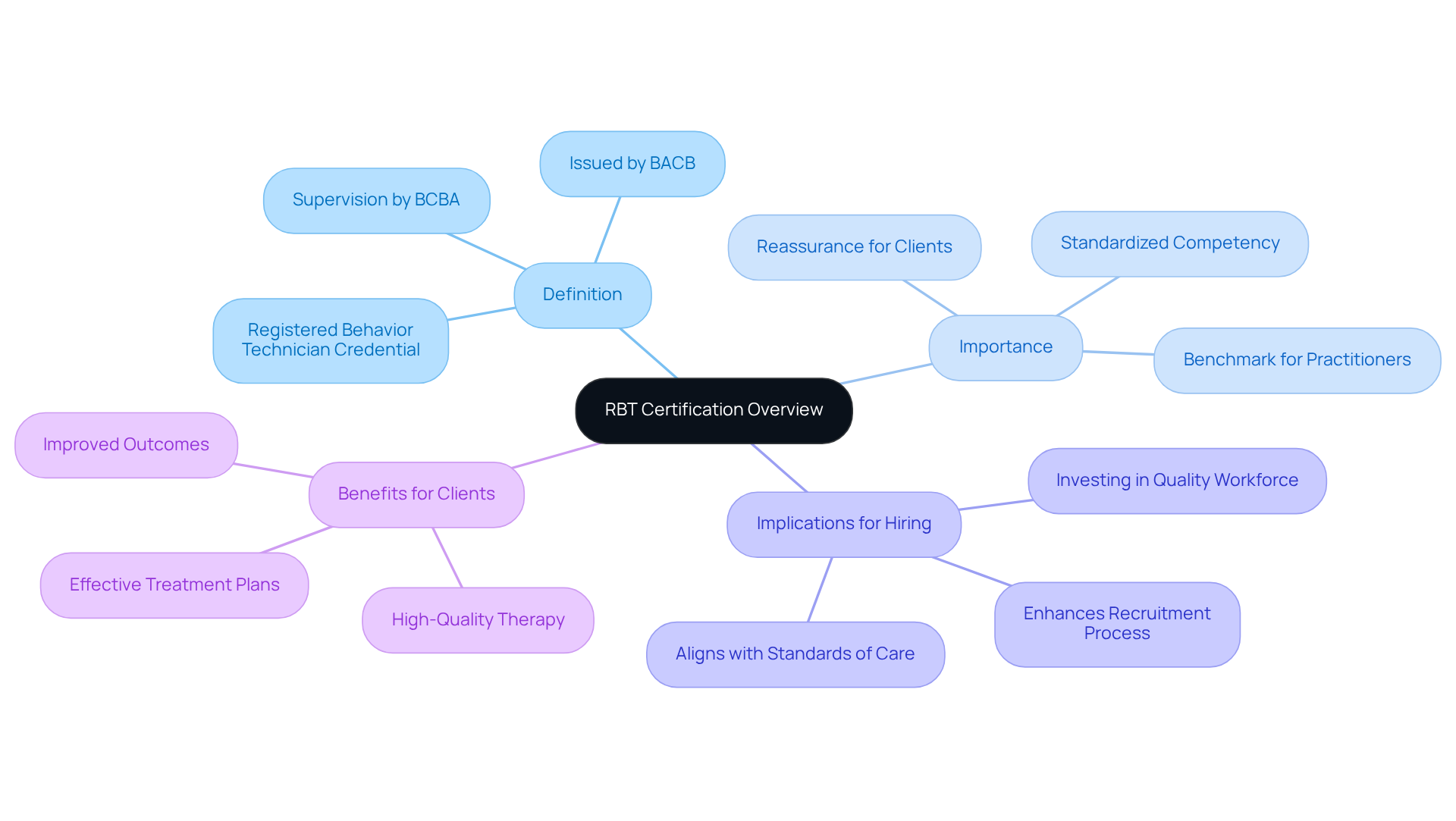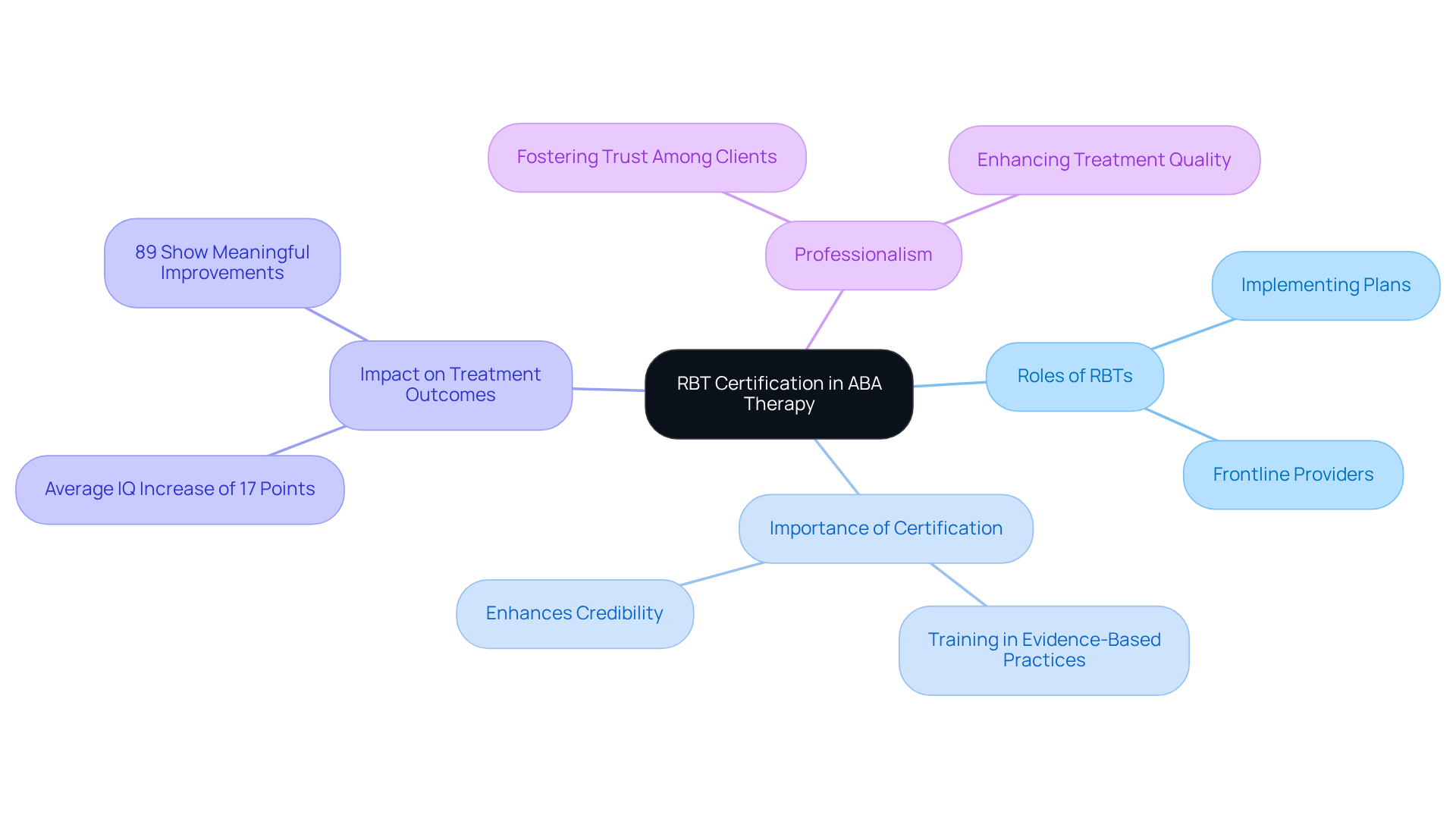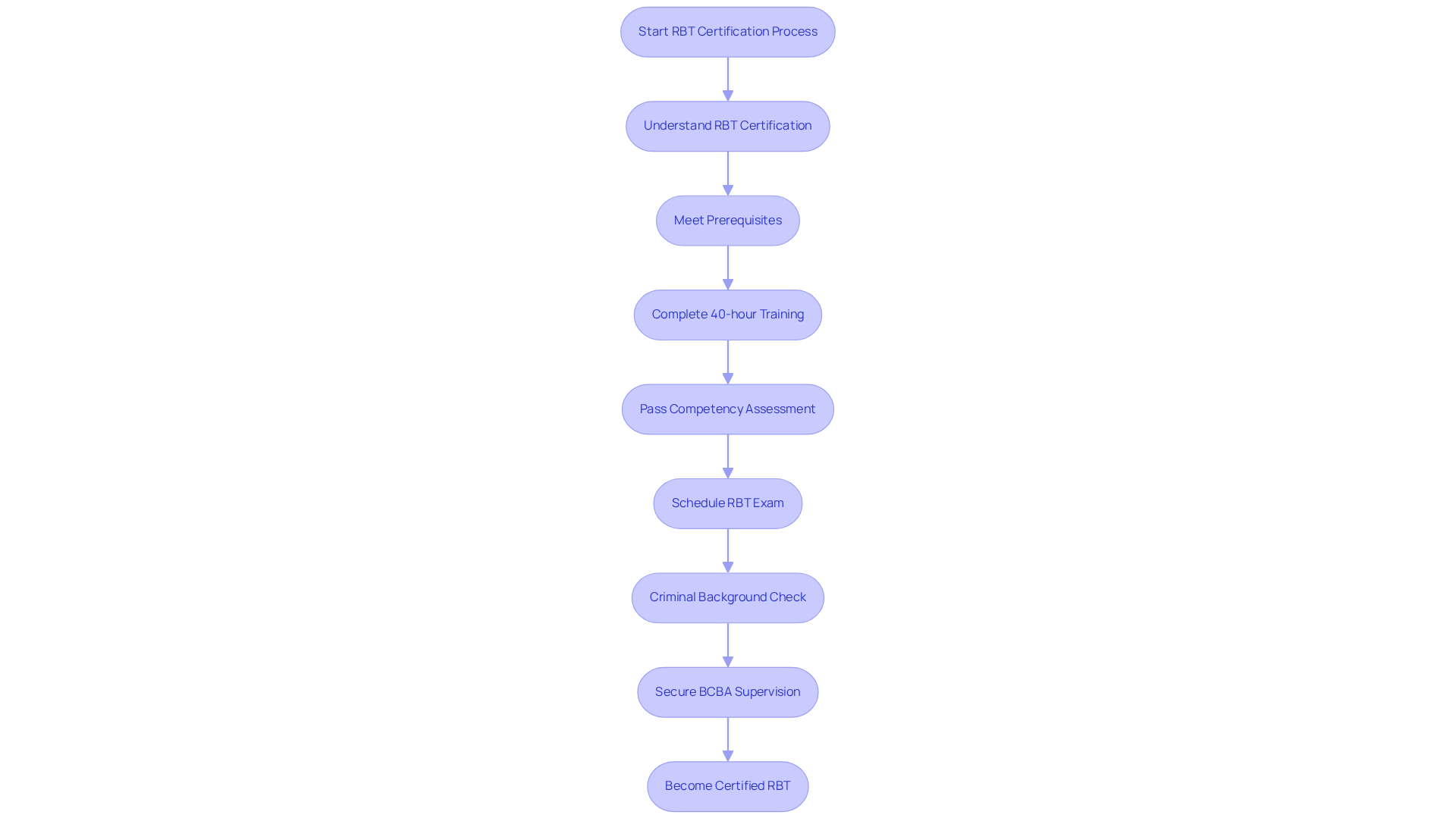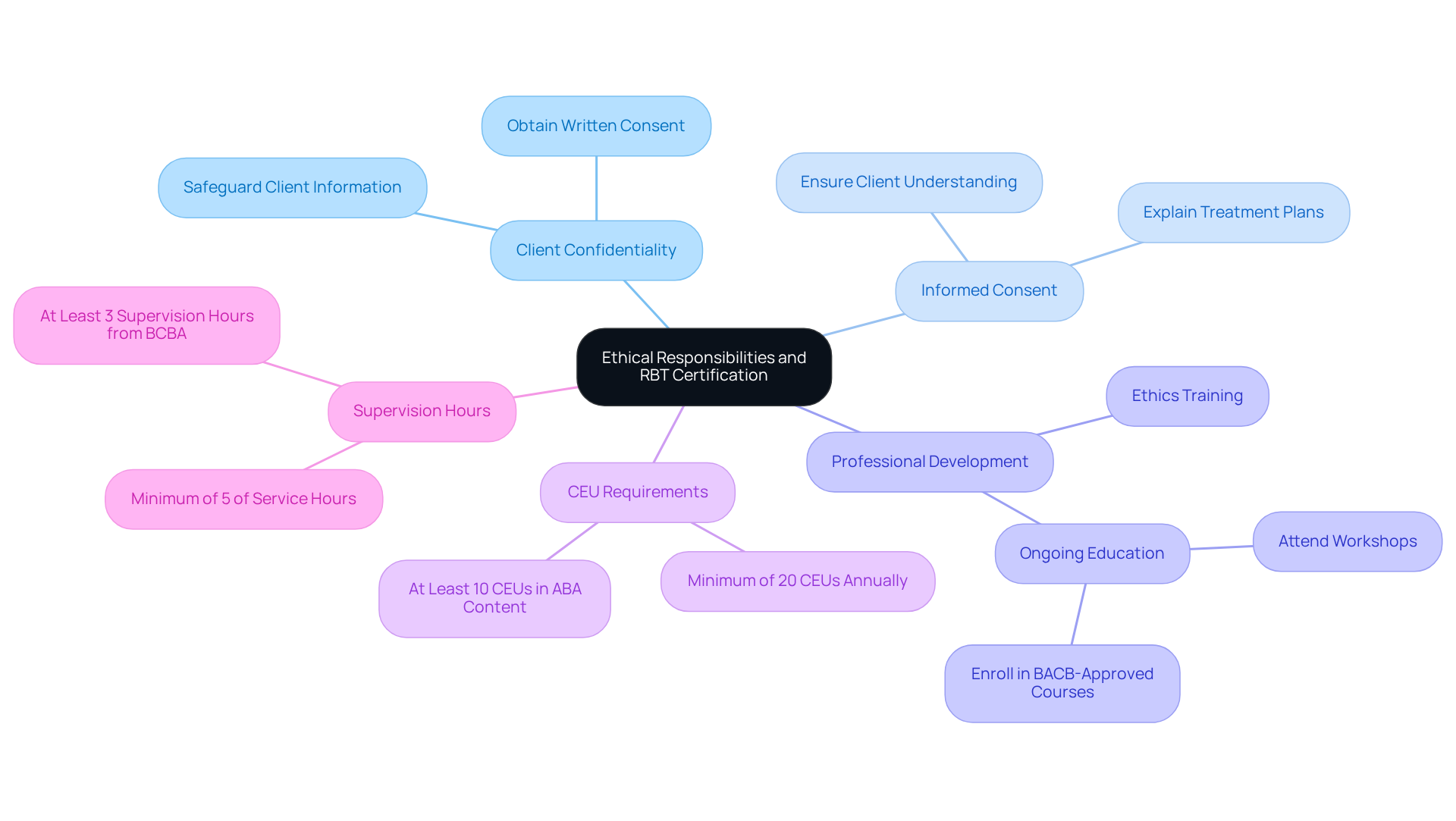September 30, 2025

The RBT certification, or Registered Behavior Technician credential, plays a crucial role in ABA therapy. It guarantees that practitioners are not only trained but also competent in delivering effective behavioral analysis services under the supervision of a BCBA. This certification establishes a standardized level of competency, which is paramount in enhancing trust among clients and employers. As a result, it ultimately leads to improved treatment outcomes for individuals receiving ABA therapy.
Consider the growing demand for qualified BCBAs in the field. With the right certification, practitioners can significantly impact the quality of care provided. The RBT credential ensures that they are equipped with the necessary skills to meet this demand. Employers can rely on this certification as a benchmark for hiring competent professionals, thus streamlining their recruitment processes.
Reflect on your current hiring challenges. Are you finding it difficult to locate qualified candidates who can deliver effective ABA therapy? Utilizing platforms like Hire ABA can address these issues, connecting you with certified professionals ready to make a difference.
In conclusion, the RBT certification is not just a formal credential; it is a testament to a practitioner's ability to provide high-quality care. By prioritizing this certification, you can enhance the reliability of your hiring process and ultimately improve the outcomes for those you serve.
Understanding the nuances of RBT certification is essential for anyone involved in the field of Applied Behavior Analysis (ABA) therapy. This credential, issued by the Behavior Analyst Certification Board, signifies a practitioner's commitment to effective therapeutic practices and serves as a critical benchmark for quality assurance in client care.
As the demand for qualified behavior technicians continues to surge, organizations face challenges in ensuring they hire professionals who meet these rigorous standards.
What are the implications of RBT certification? It not only enhances treatment outcomes but also fosters trust and professionalism within the ABA community.
The RBT certification meaning encompasses the Registered Behavior Technician credential, which is a vital qualification issued by the Behavior Analyst Certification Board (BACB) for individuals delivering analysis services under the supervision of a Board Certified Behavior Analyst (BCBA). This credential is crucial in ensuring that practitioners possess the essential skills and knowledge required to provide effective Applied Behavior Analysis (ABA) therapy. In the field of ABA, the RBT certification meaning is crucial as it establishes a standardized level of competency for professionals working directly with clients, particularly in educational and therapeutic environments.
As the demand for qualified BCBAs continues to rise, the importance of the RBT credential cannot be overstated. It serves not only as a benchmark for practitioners but also as a reassurance for clients and employers alike. Are you facing challenges in hiring competent ABA professionals? Consider how the RBT credential can enhance your recruitment process. By ensuring that your team includes RBTs, you are investing in a workforce that understands RBT certification meaning and is trained to deliver high-quality therapy, ultimately benefiting your clients and your organization.
In conclusion, understanding the RBT certification meaning reveals that it is more than just a qualification; it is a commitment to excellence in the field of ABA. By prioritizing the hiring of RBT-certified individuals, you are ensuring that your practice aligns with the RBT certification meaning, thus meeting the highest standards of care and effectiveness. Take action today—consider integrating RBTs into your team to elevate the quality of service you provide.

The RBT certification meaning is becoming increasingly vital in ABA therapy, especially as the demand for qualified BCBAs and registered behavior technicians rises. This credential ensures practitioners are trained in evidence-based practices, which are essential for achieving effective treatment outcomes. RBTs serve as the frontline providers of ABA services, directly implementing behavior intervention plans tailored to individual client needs. Their qualification showcases the RBT certification meaning, demonstrating that they have met specific educational and training criteria, thereby enhancing the credibility of the services provided.
Furthermore, the RBT certification meaning significantly elevates the professionalism of the field, fostering trust among clients, families, and employers. Research indicates that children receiving ABA therapy with RBT support experience an average IQ increase of 17 points, and 89% show meaningful improvements in adaptive functioning. This underscores the critical role of well-trained behavior technicians in delivering high-quality interventions.
As the need for qualified practitioners continues to grow, understanding the RBT certification meaning becomes increasingly essential to ensure that these professionals are equipped to meet the diverse needs of those they assist. The presence of certified RBTs not only enhances treatment outcomes but also bolsters client confidence in the effectiveness of ABA services. Ultimately, this leads to better long-term prognoses for individuals with autism and other developmental disabilities. Are you prepared to ensure your team includes certified professionals who can deliver these impactful results?

The process of obtaining RBT qualifications includes understanding the RBT certification meaning as governed by essential prerequisites set forth by the Analyst Certification Board (BACB). Candidates must be at least 18 years old and possess a high school diploma or equivalent. A critical step in this journey is the completion of a 40-hour training program that thoroughly covers the RBT certification meaning and the principles of behavior analysis. Following this training, candidates are required to pass a competency assessment, which must be completed prior to scheduling the RBT exam. This exam evaluates their understanding of ABA concepts and practices. Additionally, a criminal background check is mandatory, underscoring the importance of ethical practices in the field. Candidates must also secure supervision from a qualified Board Certified Behavior Analyst (BCBA).
The entire process typically spans 1 to 3 months, with most candidates completing their training in 2 to 4 weeks, followed by the competency assessment and exam. Once certified, registered behavior technicians are obligated to engage in ongoing supervision and continuing education to maintain their certification, which remains valid for 12 months from the date of issuance. This commitment ensures that they stay informed about best practices and advancements in the field, ultimately enhancing the quality of care provided to clients. As emphasized by industry leaders, ongoing education is essential for professionals to effectively assist individuals with behavioral needs and contribute positively to their development. Registered Behavior Technicians typically operate in diverse environments, such as private residences, clinics, schools, and hospitals, making their role vital in delivering effective ABA therapy.

Registered Behavior Technicians (RBTs) are bound by ethical responsibilities defined in the Behavior Analyst Certification Board's (BACB) Professional and Ethical Compliance Code for Behavior Analysts. These responsibilities encompass:
To uphold these standards, behavior technicians must engage in continuous professional development, ensuring their practices align with the latest ethical guidelines and evidence-based methodologies.
The RBT certification meaning includes the necessity of adhering to these ethical principles, alongside fulfilling annual requirements for supervision hours and continuing education units (CEUs). Specifically, registered behavior technicians are required to complete:
Additionally, registered behavior technicians must complete a minimum of 5% of their service hours under supervision, which is crucial for ethical practice.
Moreover, Registered Behavior Technicians are required to undergo ethics training every certification cycle to reinforce their commitment to ethical standards. This dedication to ethical practice not only elevates the quality of care provided to clients but also reinforces the integrity and credibility of the ABA profession. Statistics indicate that registered behavior technicians who actively participate in ongoing education and supervision are more likely to comply with ethical standards, thereby enhancing their effectiveness in delivering ABA services.
Real-world examples illustrate that RBTs who prioritize ethical guidelines and professional development contribute significantly to positive client outcomes and foster trust within the communities they serve. Failure to renew RBT certification meaning can lead to loss of certification, limiting employment opportunities and potentially stalling career progression.

Understanding the RBT certification meaning is essential for anyone involved in Applied Behavior Analysis (ABA) therapy. It represents a commitment to maintaining high standards of practice and ensuring that behavior technicians are equipped with the necessary skills to provide effective interventions. The RBT credential is not merely a title; it signifies a dedication to professional excellence and ethical responsibility in the field.
Throughout this article, key insights have been discussed, including:
The importance of this certification is underscored by its role in fostering trust among clients, families, and employers, while also enhancing the overall quality of ABA services.
As the demand for qualified ABA professionals continues to grow, prioritizing the hiring of RBT-certified individuals becomes increasingly crucial. Investing in certified RBTs not only elevates the quality of care provided but also contributes to better long-term outcomes for individuals with developmental disabilities. Embracing the RBT certification meaning is a proactive step towards ensuring that clients receive the best possible support and interventions tailored to their unique needs.
What does RBT certification stand for?
RBT certification stands for Registered Behavior Technician, which is a credential issued by the Behavior Analyst Certification Board (BACB).
Who issues the RBT certification?
The RBT certification is issued by the Behavior Analyst Certification Board (BACB).
What is the purpose of the RBT certification?
The RBT certification ensures that practitioners possess the essential skills and knowledge required to provide effective Applied Behavior Analysis (ABA) therapy under the supervision of a Board Certified Behavior Analyst (BCBA).
Why is the RBT certification important in the field of ABA?
The RBT certification establishes a standardized level of competency for professionals working directly with clients, particularly in educational and therapeutic environments.
How does the RBT credential benefit employers?
The RBT credential serves as a benchmark for practitioners, reassuring clients and employers of the competence of their staff, which can enhance the recruitment process for qualified ABA professionals.
What impact does hiring RBT-certified individuals have on service quality?
Hiring RBT-certified individuals ensures that the practice aligns with the standards of care and effectiveness in ABA, ultimately benefiting clients and enhancing the quality of service provided.
What commitment does the RBT certification represent?
The RBT certification represents a commitment to excellence in the field of Applied Behavior Analysis.
Our expert recruitment strategies and AI-driven sourcing ensure that you receive top-notch candidates quickly, without compromising on quality. Whether you’re looking for BCBAs, Clinical Directors, or RBTs, we’ve got you covered.